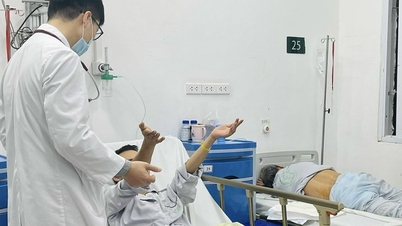 |
| Scientific research shows that drinking little water can increase blood sugar levels. (Illustration photo created by AI) |
Hyperglycemia is not only a concern for people with diabetes but also seriously affects the health of the heart, liver, eyes and nervous system if not controlled promptly.
However, many people still maintain seemingly harmless habits that silently cause blood sugar levels to rise every day.
Not drinking enough water during the day
Dehydration can reduce the body's ability to metabolize glucose, and also lead to an increase in the hormone vasopressin, which causes the liver to produce more sugar into the blood.
A study published in Diabetes Care (2011) showed that people who drink less water have a 30% higher risk of developing prediabetes.
Dr. Lori Zanini - a clinical nutritionist in the US - recommends drinking at least 1.5-2 liters of water per day. If you exercise a lot or the weather is hot, the amount of water should be increased to ensure normal metabolic function is maintained.
Drink coffee or tea in the morning with lots of sugar and condensed milk
A cup of milk tea or condensed milk coffee can contain up to 20-30g of sugar, equivalent to nearly 8 teaspoons. Added sugar not only increases blood sugar levels rapidly but also causes insulin resistance if consumed long term.
According to The American Journal of Clinical Nutrition (2015), consuming a lot of sugary drinks in the morning can lead to postprandial blood glucose disorders, especially in people at high risk of type 2 diabetes.
Lack of fiber and protein in meals
Fiber helps slow down the absorption of carbohydrates, while protein stabilizes satiety and regulates the hormone insulin. A meal lacking these two components will cause blood sugar to spike after eating because the body absorbs sugar faster.
Dr. David Ludwig - an endocrinologist at Harvard University (USA) - emphasizes the importance of combining fiber from vegetables and whole grains with quality protein sources such as eggs, fish, tofu, and chicken breast in every meal.
Frequently order food out
Processed foods are often high in saturated fat, refined starches, and hidden sugars. In addition, large portions and poor nutrient balance contribute to rapid blood sugar spikes after meals.
According to the Journal of Nutrition (2020), people who ate out more than 4 times/week had average blood sugar levels 15% higher than the group who cooked for themselves, even when the overall calorie intake did not differ much.
Sitting too long, little exercise
Sitting for long periods of time, especially after eating, slows down the body's use of glucose, causing blood sugar levels to remain high for longer periods of time. This can affect even people without diabetes.
According to Diabetologia (2012), just walking lightly for 10 minutes after eating can significantly reduce post-meal blood sugar peaks by up to 22%.
Chronic sleep deprivation
Lack of sleep increases cortisol, the stress hormone, which increases insulin resistance and causes glucose to build up in the blood. It also increases cravings for sweets and refined carbohydrates the next day.
Sleep expert Dr. Michael Breus recommends that adults get 7-8 hours of sleep each night to support efficient glucose metabolism and reduce the risk of chronic hyperglycemia.
High blood sugar is not always caused by a diet high in sugar or starch. It is the seemingly harmless daily habits that are the silent culprits causing blood sugar to rise uncontrollably.
Early detection and timely adjustment will help you protect your health and effectively prevent serious complications of blood sugar disorders.
Source: https://baoquocte.vn/sau-thoi-quen-khong-ngo-khien-duong-huet-tang-cao-318312.html
































































































Comment (0)